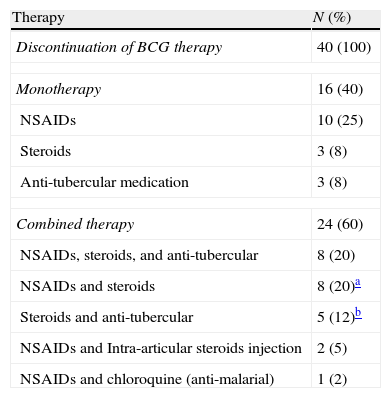We sought to identify the prevalence, presentation, treatment, and prognosis of acute arthritis secondary to intravesical bacilli Calmette-Guérin (BCG) therapy for bladder cancer.
MethodsWe performed a structured, systematic review of the English language literature pertaining to BCG and reactive arthritis among bladder cancer patients. We extracted data pertaining to prevalence, presentation, management, and prognosis.
ResultsWe extracted 23 individual case reports and 4 review articles. Thirty-nine patients—31 (80%) male and 8 (20%) female—were described in these publications; we also identified 1 patient from our institution. Although prevalence estimates of reactive arthritis range from 0.5% to 1.0% of all bladder cancer patients receiving BCG, the true prevalence remains unclear. Polyarthritis (68%) and fever (58%) were the most common presenting symptoms. Among patients presenting with joint pain, the knees (41%), ankles (26%), and wrists (19%) were most often affected. The most common time of presentation was immediately following the 4th instillation of a 6-week induction course (25%). Initial therapy in 100% of patients was discontinuation of BCG. Other therapies included nonsteroidal anti-inflammatory drugs (NSAIDs) (25%); steroids (8%); anti-tubercular medications (8%); and combined NSAIDs, steroids, and anti-tubercular medications (20%).
ConclusionsReactive arthritis is an infrequent but potentially severe complication of intravesical BCG for bladder cancer that typically presents with polyarthritis and fever during induction. The most common treatments include immediate discontinuation of BCG and systemic anti-inflammatory therapy. Further studies are needed to determine prevalence, pathophysiology, and long-term prognosis.
Tratamos de identificar la prevalencia, presentación, tratamiento y pronóstico de la artritis aguda secundaria al tratamiento de los bacilos de Calmette-Guérin (BCG) intravesicales en el cáncer de vejiga.
MétodosSe realizó una revisión estructurada y sistemática de la literatura en lengua inglesa relacionada con el BCG y la artritis reactiva en pacientes con cáncer de vejiga. Se extrajeron los datos relativos a la prevalencia, presentación, manejo y pronóstico.
ResultadosSe obtuvieron 23 informes de casos individuales y 4 artículos de revisión. Treinta y nueve pacientes-31 (80%) eran hombres y 8 (20%) mujeres-fueron descritos en estas publicaciones; también identificamos 1 paciente de nuestra institución. Aunque las estimaciones de prevalencia de la artritis reactiva oscilan entre el 0,5% y 1,0% de todos los pacientes de cáncer de vejiga que recibieron BCG, la verdadera prevalencia sigue siendo poco clara. La poliartritis (68%) y la fiebre (58%) fueron los síntomas más comunes. Entre los pacientes que presentaban dolor en las articulaciones, las rodillas (41%), tobillos (26%) y las muñecas (19%) fueron los más afectados. El tiempo de presentación más frecuente fue inmediatamente después de la cuarta instilación de un curso de inducción de 6 semanas (25%). La terapia inicial en el 100% de los pacientes fue la interrupción del BCG. Otros tratamientos incluyeron fármacos antiinflamatorios no esteroideos (AINE) (25%), esteroides (8%), medicamentos antituberculosos (8%) y una combinación de AINEs, esteroides y medicamentos antituberculosos (20%).
ConclusionesLa artritis reactiva es una complicación poco frecuente pero potencialmente grave de BCG intravesical en el cáncer de vejiga que se presenta típicamente con poliartritis y fiebre durante la inducción. Los tratamientos más comunes incluyen la suspensión inmediata del BCG y la terapia anti-inflamatoria sistémica. Se necesitan más estudios para determinar la prevalencia, la fisiopatología y el pronóstico a largo plazo.








